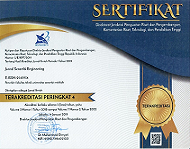Analisis Risiko Lingkungan, Sosial Ekonomi, dan Kesehatan Akibat Pelepasan Polusi Termal Air Bahang PLTU Paiton
Keywords:
condenser heat water, environmental risk, health risk, marine pollution, seawater temperature, socio economic risk, thermal pollutionAbstract
Paiton Power Station uses surface water for the cooling system. The seawater flowing into the heat exchanger system is returned to the water body and has higher water temperature characteristics than the natural temperature of seawater. There is a recorded change in the temperature of the waters around the Paiton PLTU due to the discharge of hot water at the outlet water discharge reaching 6.50C. The impact of hot water discharge on aquatic ecosystems has become an important issue in marine and environmental protection. The assessment of environmental risks caused by hot water was carried out using a qualitative method based on monitoring data from PLTU Paiton. The aspects assessed include ecological, socio- economic and health aspects. The identification of risks due to the release of hot water resulted in 15 risks. Based on the risk level assessment, 3 low risks, 1 medium risk, 5 high risks and 6 very high risks were obtained. In terms of risk acceptability, there are 2 unacceptable risks associated with increased water temperature. The mitigation measures that need to be taken are a reassessment of the licensing of the temperature limit of the hot water that can be discharged into the waters.
















